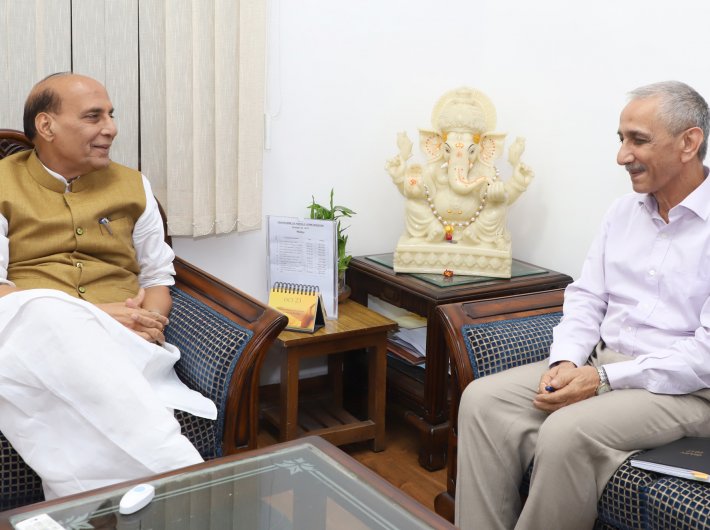Because the root of the problem lies elsewhere -- and radicalisation is on the rise
After a series of consultations with various groups in Jammu and Kashmir during his visit of the state last week, the union government’s designated interlocutor and former intelligence bureau (IB) chief Dineshwar Sharma returned to Delhi and is briefing the union home ministry this week about the developments.
And there are enough straws in the wind to suggest that Sharma’s talks may have broken the ice on Kashmir with various interested groups but have fallen far short of generating “over-optimism” in the home ministry. In fact, those dealing with the security issues in Kashmir point out that it would not bring any material change in the situation.
“It would be naïve to expect an interlocutor to resolve as complex an issue as Kashmir,” points out a senior functionary of the government. At the same time, Sharma’s appointment as interlocutor is seen as a move to put across the message that the government was not averse to talking to any interested group, including separatists like Hurriyat. The fact that Hurriyat chose to ignore the initiative would be touted as hardening of position by the Hurriyat leadership and its aversion to talks.
Alongside the new initiative on Jammu and Kashmir, the union government is determined to continue with its hard-nosed strategy of dealing with the militancy in toughest measures. The government sees “no contradiction” in its approach in so far as Kashmir is concerned.
Highly placed sources say that the security forces and the army were directed to launch an all-out offensive against local and foreign militants pushed inside India by Pakistan’s Inter Service Intelligence (ISI) and the Pakistani army. They point out that though India’s offensive against the militancy in the valley has been highly successful, Pakistan has simultaneously intensified its activity to foment the trouble in Jammu and Kashmir.
“We know it too well that the root of the problem lies in Pakistan,” says an official of the home ministry which is keen to pursue a “pragmatic and not emotional approach” to the problem. “You see, you cannot wish the Kashmir problem can be solved until Pakistan gives up its policy of funding, radicalising, arming a section of youth in the valley and pushing militants from across the border in the name of religion,” he says, adding that ground realities in Kashmir were quite ominous to expect peace in the state.
A SWOT – strength, weakness, opportunities and threat – analysis of the Kashmir situation, made by the home minister, is indicative of the fact that despite India’s high alert on the border, the Pakistan army keeps on pushing militants through the porous gaps in the border. However, unlike the past when foreign militants had a longer life, the average life of such militants is drastically reduced to weeks. For instance, the recent killing of Talha Rasheed, nephew of Jaish-e-Mohammad chief Masood Azhar, is only the latest in a long list of foreign militants liquidated by the army in the last year or so.
But what appears to be causing concern is the fact that despite India’s aggressive moves and patrolling along the border, Pakistan seems equally determined to stoke fires in the valley. Though the BSF has been upgrading the technology to monitor the border, infiltrations have continued. “It will take another four to five years to use technology effectively to seal the border completely,” officials of the home ministry say.
At the same time, the home ministry has also directed the National Investigation Agency (NIA) to squeeze the funds funneled to insurgents through hawala networks. The NIA launched a series of raids in the recent past to unearth the source of funding for separatists routed through various sources. “We have seized crores of rupees meant for separatists,” say official sources.
Another front that the home ministry has been dealing with is the increasing radicalisation in the valley. “It is growing by the day,” they point out. Authorities are making efforts to mainstream a large section of society by initiating local recruitment in security forces and taking up various programmes of social interactions across the country. “But these antidotes are far inadequate to meet the enormous challenge,” officials point out.
Dineshwar Sharma’s initiative, though fully backed by the union government, is unlikely to make a substantive breakthrough in Jammu and Kashmir. His position is already questioned by mainstream political parties and their leaders since he is a retired police officer. Though the home ministry gave a full mandate to Sharma to carry out the negotiations, the entire exercise is unlikely to create more than an optical illusion in Kashmir.
[This article appeared on FirstPost.com]



